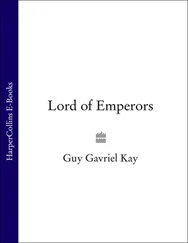“You. What are you doing here?”
Shiwei kept his expression bland. The guard had a torch, was only doing routine rounds. He was chubby and his cloak was awry.
“Waiting for some girls. Take them back.” He stayed in shadow.
“You’ll wait a long time.”
Shiwei offered a chuckle. “Usually do.”
The torch was lifted. He saw the guard’s round face. The round-faced guard saw him.
“I know you,” the man said. Which was unfortunate. “You work for the deputy prime minister, not the pleasure district. Saw you with his wife here when—”
When you had to kill you did, and you needed to know when such a moment came. Couldn’t leave this one alive: he’d report later, could identify Shiwei. It was unexpected, an irritation. And it changed his timing, too.
He pulled his knife from the guard’s chest slowly, holding the man upright against him, shielded by the arch. He kept talking quietly, meaningless words, in case anyone passed close. He’d grabbed the torch from the dead man before he could drop it. A fallen, flaring torch would, sure as spirits flew at night, get attention. Fire was the enemy, everywhere.
Shiwei had picked his spot carefully. Edge of the courtyard where the house he wanted stood. Under cover, with a recessed space farther into the passageway where he could drag a dead man and lay him down, mostly out of sight.
Mostly was the best he was going to get. And that meant he had to move now instead of waiting for the crowd to thin and people in the compound to generally be asleep—including those in the house across the way, where he was going.
He didn’t regret killing the guard. He regretted the complications it caused. They might still be awake in that house. The woman he was here to kill might be.
He knew the house, he was just about certain he knew the room. That was why he’d come early, instead of waiting until dark. He’d pretended to deliver an empty letter to their door, after getting directions from a guard other than the ones who’d watched him come through with the singing girls.
Eventually he’d seen her come into the courtyard and cross it to her home, walking with a servant, no husband in sight. She’d been out without her husband, home at twilight, brazen as you please. There were no morals left among women in the world, Sun Shiwei had often thought.
The houses were mostly similar in the compound. Variations depended on status and degree of closeness to the emperor. A few were extremely large, more than one courtyard inside their walls, but not this one.
The bedroom she’d use—or they’d use, if the absent husband ever went in to indulge himself with her—would be on the women’s side, to the right at the back. Shiwei had intended to get over the wall into their courtyard then climb up to her room. He had even worked out his hand- and foot-holds for the wall, waiting here.
Couldn’t do it that way now. Too many people around for a man to safely climb a wall, even at night. They might think he was just a lover, and leave it alone, or they might not. There was a moon, too, almost full. He wouldn’t have picked a night with a moon, but he didn’t get to do the choosing in these things, did he?
He’d been told to make this look like an assault on the woman—some vicious predator in the clan compound having his hard way with a girl, then killing her. He could deal with that part. She’d have to be dead, first, for silence and safety, but he’d done that before.
He stepped out from the archway and began crossing the courtyard, not hurrying. Timed and angled it so he wouldn’t pass close to anyone, but he made sure not to seem obvious about that. He’d have liked to be wearing black. Kanlin Warriors had always worn black. It would have been pleasing to appear to victims that way: a dark apparition, a cold spirit, appearing in the night to destroy them.
But black would have been too noticeable. This wasn’t the old days. He couldn’t safely be distinctive. He was dressed the way an escort for musicians and singing girls would be: brown and green, tunic and trousers, a soft dark hat, no visible weapon (you didn’t carry visible weapons into the clan compound unless you were an idiot). There was blood on his cloak now, but it was night and the fabric was dark.
And there wasn’t anything he could do about it, was there?
He couldn’t climb the wall and risk being seen. He wondered if a high-level Kanlin would have known how to do that, be invisible for long enough, or sense the precise moment when no one was looking. He wondered if their training taught them that. The thought made him almost sad.
But there were other ways of doing what he was here to do. He went straight for the door of her house. The doorway was recessed, under a lintel (they all were), and it was dark there. They weren’t expecting guests, had no exterior torches lit. He pretended to knock, in case anyone passing looked over, but he made no sound. He wasn’t a fool. He fished from his inner pocket the tool he used for doors. He tried the handle first.
It moved with a small click. There might be fools here, but they lived inside the compound, inside this house, they weren’t standing in Sun Shiwei’s boots tonight.
The imperial clan would all have valuable objects in their homes, but they lived in such sublime assurance of favour and protection that they didn’t even lock their doors. He wondered, briefly, what kind of life could lead you to see the world that way.
He pushed the door open onto a dark hallway. Lifted a hand, as if greeting someone within. Stepped inside, closed the door silently behind him, not rushing at all. Inside, he drew a breath. It would be easy now. He was out of sight, and where he needed to be.
A thread of excitement prickled along his blood. He suppressed it. Not yet, he told himself. She needed killing first, and there would be servants down here, or even upstairs. She might even be in bed with one of them, with the husband gone. Maybe with another woman. They were said to be like that, the wives of the imperial clan.
No light on this level, no sound of movement as he listened. It was just late enough that they might be asleep after all. He moved quietly to where he knew the stairway would be, and then up, testing each stair. One creaked slightly under light pressure and he double-stepped his way over it. You learned the tricks, doing this sort of thing long enough.
He took out his knife, already bloodied. He ought to have cleaned it, but there hadn’t been time. He preferred a clean knife. It felt … well, cleaner. Top of the stairs. Hallways ran left and right, elbow-bends to corridors each way. Women’s quarters would be on the right. Still no servants, no lights. They were asleep.
He went right, his eyes adjusting, saw calligraphy scrolls hanging on the inner wall, moved carefully around over-large tables with what looked like bronze vessels on them. He slowed down. If he banged into one of those the noise would rouse someone, bring men running from downstairs, people from outside, and everything would be marred.
He didn’t bump anything. He prided himself on seeing well in the dark, a skill in his profession. He turned at the long corridor towards the back of the house. It was open on his right side here, a waist-high railing above their small courtyard. There was moonlight. He saw more bronzes below, outside, and what looked liked a funerary stele in the centre.
He had no idea what these people were doing with such things, but why would he expect to have an idea, or care? He was a weapon, they were targets. Or she was. He had been told the husband didn’t matter. It was the wife who had offended. He didn’t know how. It wasn’t his job to know.
The corridor jogged left and then right again to where her room lay, at the back. She was on the right, over the courtyard. She’d have a balcony. He stopped and listened again. Creaks and groans of a night house. Sounds from the public spaces behind him. There was a shout back there and he stiffened, but it was an amused cry, followed by another, even more lively. Men coming back, or heading out—it wasn’t too late for that. It was never too late for the pleasure districts. He might go that way himself after, he thought.
Читать дальше












